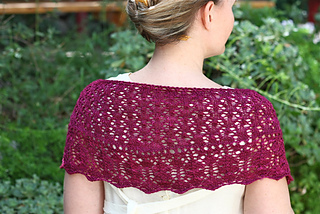patterns >  Mind of Winter Fire Collection and 1 more...
Mind of Winter Fire Collection and 1 more...
> Frambuesa










Frambuesa
Spring is officially here -- the season of light, airy knits and bright colors. Frambuesa is my ode to spring. It’s a crescent shawl available in two sizes, a shawlette to drape over your shoulders, and a larger full shawl size to wear wrapped around you on those still chilly nights. Frambuesa is available as an individual pdf or as part of the Fire Collection, which includes Corazon and Mexican Wedding. If you previously purchased one or both of those patterns, the price of the collection will be discounted by the amount of your previous purchase(s).
The shawlette sample is shown in SweetGeorgia Yarns Superwash Sock in the “Raspberry” colorway. Frambuesa is suitable for intermediate lace knitters. Please see specific required skills below. Instructions are both written and charted. The pattern has been professionally tech edited to reduce the possibility for error, but if you have questions or believe that you have found an error, please contact me.
required skills
lace knitting
increasing (m1)
decreasing (ssk, p2togtbl)
short rows (used to shape the crescent, instructions are included)
finished measurements
46 (66 ½)” / 117 (169) cm long.
10 (12 ¾)” / 25.5 (32.5) cm deep.
yarn
1 (2) skein(s) SweetGeorgia Superwash Sock in “Raspberry”; 400 yds / 366 m per 115 g; 100% superwash merino wool.
Shawlette requires approximately 350 (590) yds / 320 (540) m of fingering weight yarn when worked at specified gauge.
needles & notions
US 6 (4.0 mm) needles, at least 24” / 60 cm long.
OR size necessary to make gauge.
10 (15) stitch markers
waste yarn
darning needle
blocking wires and/or pins
gauge
17 sts and 31 rows per 4” / 10 cm in Lower Border Pattern.
17 sts and 37 rows per 4” / 10 cm in Center Shawl Pattern.
Gauge is not crucial for this project, but it is necessary to check gauge if you do not have significant excess yarn to compensate for any gauge variances. It is also useful to swatch in both patterns to familiarize yourself with the stitch patterns.
The pattern is suitable for a range of yarn weights, but the yardage given is calculated using fingering weight yarn. Finished size and required yardage will vary with gauge and yarn weight.
construction
The shawl is worked flat from the bottom up. The border is worked first without shaping, and then the shawl center is worked with a combination of decreases and short rows to form a crescent shape.
1382 projects
stashed
1567 times
- First published: April 2013
- Page created: April 23, 2013
- Last updated: December 30, 2015 …
- visits in the last 24 hours
- visitors right now





